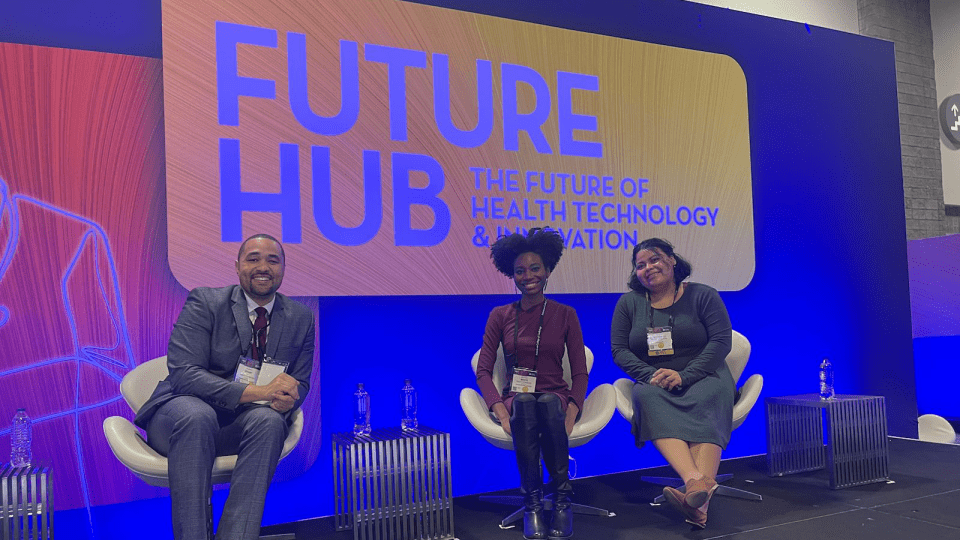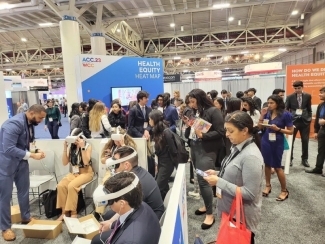Radical Empathy Through Virtual Reality: Tech Has Power to Transform the Patient Experience
February 19, 2024
- Author
- Jay Pfeifer

Aubrey J. Grant ’10, M.D., Whitney A. White ’08 and Leslie Alvarado ’17
You are Tracy. You are a transgender woman. You are a patient at a cardiologist’s office. You know the statistics. You know that transgender persons have a higher incidence of cardiovascular disease, but the doctor’s office has never felt comfortable to you. You are sitting in a sterile examination room. After being misgendered by the front desk staff and the dismissive nurse, the doctor enters and after a quick introduction, he tells you that he is going to take care of you. But you can sense that this doctor does not have experience with transgender persons. You have concerns, but before you can say something, the doctor is gone.
Then, you lift a virtual reality headset from your eyes. You were Tracy for just seven minutes. But three Davidson College alums believe that those seven minutes will change how you see the world.
Whitney A. White ’08, Aubrey J. Grant ’10, M.D., and Leslie Alvarado ’17 are the brains behind Equity Commons, a company using virtual reality to confront – and hopefully eliminate – implicit bias.
They are using cutting-edge tech to tackle a problem that has warped human behavior since the dawn of consciousness.
But their story begins with an old-fashioned treat: sweet potato pie.
In August 2006, Aubrey J. Grant had just shown up to Davidson as a first-year soccer player. Then known as “A.J.,” Grant had the good fortune of being paired with White as a “big sister.” A Belk Scholar who was two years ahead of Grant, she came to their first meeting with a dessert that felt like home.
“In those early days of college, you're trying to unpack, you're trying to be a collegiate soccer player, you're literally trying to do everything,” Grant said. “I was over my head with responsibility.”
“And here is this human, you know, bringing sweet potato pie. My mom makes an incredible sweet potato pie, too. That really made me feel like, ‘Oh, I have found my people. I found my tribe.’”
Now almost 20 years later, Grant is a sports cardiologist in Washington, D.C., and White is a global entrepreneur.
Their jobs have taken them all over the world but they did what friends do: They stayed in touch.
“We would have these quarterly check-ins,” Grant said. “We'd go to brunch or lunch or dinner or have a cocktail.”
One of these check-ins gave rise to Equity Commons.
Seeing the Problems First-Hand
While he was a resident at Emory University in Atlanta from 2016-19, Grant saw first-hand the persistent and insidious consequences of implicit bias. In medicine, these hidden attitudes and stereotypes create blind spots that adversely affect patient care – and undermine the best intentions of medical caregivers.
Grant started giving presentations to his peers and colleagues to bring awareness to this hidden menace.
“Everyone was like, ‘Oh, you know, it's such a big deal. But what can we do about it to fix it?’” he said.
“I didn't have answers. I was perplexed. And whenever I'm perplexed, I go to brunch with Whitney.”
His timing was perfect. White had just helped expand the Tech Impact Fund at the Jay Hurt Hub for Innovation & Entrepreneurship. And she had just met Leslie Alvarado, one of the inaugural Tech Impact Fellows.
“I remembered Leslie's initial proposal,” White said. ”She was really making the case for using virtual reality to help Davidson students put themselves in the shoes of what it would be like as a Black male student at Davidson.”
Alvarado was a math major who had been exposed to VR by her advisor, virtual reality expert Professor Tabitha Peck.
“I had always wondered why is it that sometimes when you try to explain microaggressions and implicit bias to people, they just don't get it?” Alvarado said.
“Why isn't there some video game you can just do where they can see it? And when I tried VR, I was like, ‘Oh my, this is it.’”
Her first VR project put the user in the shoes of an avatar of a fictional Black Davidson student named Bernard. He’s just heard about the 2016 police shooting of Keith Lamont Scott that caused protests across Charlotte. The script follows Bernard for seven minutes as he encounters friends and acquaintances across campus.
“He has an interaction with a white student, who's his friend, … And his friend is like, ‘Hey, thanks. You're one of the good ones.’”
As she worked on the script, she shared a draft with her Black friends.
“One of the things that resonated … is that they were all like, ‘This happens. This is what it’s like to be a Black person at Davidson.’”
On the flip side, her white friends found Bernard’s experience surprising and deeply moving.
“One of my white friends went through the experience, and he was like, ‘I've said that to people, and I had no idea what I was saying.’”
White called Alvarado in 2018. Her timing was perfect – Alvarado had just left a job with a startup but had continued consulting on VR projects at Davidson. Equity Commons was born.
Changing Minds
The team spent the next couple of years refining their product and building a pilot experience that they tested on Grant’s cardiology colleagues at Georgetown University.
Equity Commons has been staging commercial experiences since 2022 and now deploy VR headsets at large medical conferences, in boardrooms and at companies around the world.

Equity Commons hosts a VR experience at ACC 2023
Grant frequently sets up 10 white Meta Quest headsets at cardiology conferences, ushering dozens of doctors and caregivers through VR experiences similar to the one featuring Tracy, the transgender cardiac patient.
“People will take off the headset and they'll just be like, ‘Wow, that has happened to me.’” he said. “And they'll tell me this intimate story about how they experienced bias or, you know, a doctor wasn't listening to them or they had some sort of negative outcome because of implicit bias in health care.”
Grant has taken several of his cardiology colleagues at MedStar Health through Equity Commons sessions and found it deeply valuable in shifting their awareness of their own biases.
"As cardiologists, it is our responsibility to ensure that every patient receives the highest standard of care, regardless of their background,” said Stephany Gabaud, M.D., chief cardiology fellow at MedStar Health/Georgetown University. “Equity Commons training equips our fellows with the knowledge and skills to recognize and address implicit bias, ultimately enhancing the quality of care we provide.
“I firmly believe that Equity Commons training on implicit bias at Georgetown University/MedStar Health is an essential step towards fostering a healthcare environment that upholds the principles of fairness and justice.”
They also create bespoke experiences to address unique challenges at the request of clients.
Whether using custom scenarios or those from their existing library of virtual reality modules, all trainings feature surveys before and after the experience to measure their effect – and structured group debriefs so participants can reflect on their experiences and debrief with co-workers.
“These companies are in a place where they've already done lots of traditional trainings, like workshops and lunch-and-learns,” White said.
“And there are people who still don't get it, right?”
Until they put on the headset. That shift in perspective drives it home. They can finally see how it feels to be someone else.
“What they feel is: I am this person, these things are happening to me,” White said. “So they can actually have that level of empathy. That’s what we do.”



